
The last few years have seen a surge in FTD clinical trials, as researchers around the world are increasingly studying potential disease-modifying treatments. Although persons with a confirmed genetic form of FTD are responsible for a minority of diagnoses, many current clinical trials are only enrolling participants with genetic FTD. Why are researchers focused on the smaller portion of people with genetic FTD? Are people with non-genetic FTD being ignored in clinical trials?
There are several reasons that many of these first trials are focusing on genetic FTD. For one, when an FTD-causing genetic variant is identified, researchers can be confident that the diagnosis is accurate. FTD is challenging to diagnose because it often mimics other disorders. Until we have reliable FTD biomarkers, a diagnosis in a person without a genetic mutation requires an analysis of their medical history, neurological examination, neuropsychological testing, neuroimaging, and blood tests, all carefully conducted by clinicians who understand FTD and its symptoms. Even then, misdiagnoses are common. By enrolling people with confirmed genetic forms of FTD in their trials, researchers can be more certain that any effect they see is likely due to their intervention impacting FTD.
Additionally, when the specific genetic cause for FTD is known, researchers have a better understanding of how to approach a potential treatment. Researchers can study the gene and understand how it is supposed to function; then they can develop treatments to improve the gene’s function. Genes act like recipes for proteins. If a gene is not making enough protein, a treatment could be developed to give more of that protein to the person by another method. If a gene is making a faulty protein, a treatment might focus on removing it, or on blocking the gene from making the faulty protein in the first place.
As an example: when a person has FTD due to a variant in the GRN gene, usually the genetic change causes GRN to make less of its protein, called progranulin. Progranulin is necessary for good brain health. Without enough progranulin, a different protein, TDP-43, builds up, causing FTD. Many current trials are focused on increasing progranulin levels to help slow FTD progression or stop FTD from developing. Such trials focus on GRN because safely increasing levels of a protein is easier than removing the faulty or FTD-causing proteins in other forms of FTD, such as FTD caused by the genes MAPT or C9orf72.
Even though many trials right now are focusing on FTD caused by variants in the GRN gene, their potential success may help treat other forms of FTD. FTD is caused by an excessive aggregation of proteins in the brain: often TDP-43 (associated with variants in the C9orf72 or GRN genes) or tau (associated with the MAPT gene). If a drug targeting a specific genetic cause leads to reduced protein aggregation, researchers may better understand how to prevent TDP-43 or tau protein accumulations found in other genetic forms of FTD, and in people without an identifiable genetic cause. Additionally, TDP-43 often presents in people with ALS; a scientific breakthrough in reducing TDP-43 aggregation could benefit those with ALS.
Research participation is key. People living with genetic forms of FTD are vital to help researchers discover the key to treating all forms of FTD. There are also clinical trials available for people with sporadic FTD. To learn more, visit the Studies Seeking Participants page of AFTD’s website (theaftd.org/research-clinical-trials/featured-studies). You can also sign up for the FTD Disorders Registry (ftdregistry.org) to learn about new opportunities to enroll in clinical trials as they arise.
You can also learn more about FTD and genetics by visiting theaftd.org/what-is-ftd/genetics-overview. As our knowledge of FTD’s genetic causes is constantly evolving, this section of our website will be updated to reflect new information.
Finally, if you know you are at genetic risk of FTD, or if your family has a history of FTD, AFTD is here to help. Contact the AFTD HelpLine (info@theaftd.org, 866-507-7222) to learn more about special support group options designed to inform and assist you while navigating this journey.
Genetic vs. Non-Genetic FTD
Approximately 60 percent of persons diagnosed with FTD have no known or identifiable cause of their disease. In the remaining 40 percent, other family members have been previously diagnosed with FTD, a different dementia, a psychiatric condition, or a neurodegenerative condition such as Parkinson’s disease, suggesting an inherited cause in the family. (In families with more than one person diagnosed with FTD, there is more likely a specific genetic cause.) These percentages are likely to change, however, as – due to increased awareness, access, and affordability – more people seek genetic counseling and testing.
FTD-Causing Genetic Variants
Researchers have identified more than a dozen genes that can cause FTD, but the three most common are C9orf72, GRN, and MAPT.
C9orf72 - The genetic variant in the C9orf72 gene is typically a repeated segment of DNA. In most people this segment repeats up to 24 times, but in people with FTD, it repeats more than 60 times, leading to a cascade of events that result in an abnormal accumulation of the protein TDP-43 in the brain. People with a C9orf72 variant can develop FTD, ALS, or both FTD and ALS.
GRN - The GRN gene provides instructions for making a protein called progranulin, which is involved in cell survival and regulating inflammation. GRN variants suppress progranulin production while causing TDP-43 to accumulate excessively, leading to FTD. The relationship between GRN variants, decreased levels of progranulin, and abnormal TDP-43 accumulation is not fully understood.
MAPT - The MAPT gene provides instructions for making a protein called tau, which helps assemble and stabilize nerve cells in the brain. Variants in MAPT result in abnormal accumulation of tau protein in the brain, causing FTD.
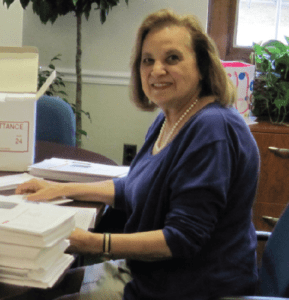 Joyce Shenian, a founding AFTD Board member who played an essential role in shaping the organization in its earliest years, died on February 18 in Gladwyne, Penn., surrounded by family.
Joyce Shenian, a founding AFTD Board member who played an essential role in shaping the organization in its earliest years, died on February 18 in Gladwyne, Penn., surrounded by family.
Ms. Shenian’s late husband, Popkin, was the first director of research and development for General Electric’s plastics division before being diagnosed with FTD. Frustrated by years of misdiagnoses, Ms. Shenian was motivated to take action to help other families facing the disease.
Alongside fellow FTD advocates Helen-Ann Comstock, Fytie Drayton, and Lisa Radin, Joyce helped plan the first American conference devoted to FTD (then better known as Pick’s Disease), which was held in Philadelphia in May 1999. A few years later, when Ms. Comstock founded AFTD, Ms. Shenian (along with Ms. Radin and Ms. Drayton) sat on its inaugural Board.
As AFTD’s Board Treasurer (and, later, Secretary), Ms. Shenian helped to collect mail, deposit checks, respond to memorial donations and correspondence, and produce financial reports, all on a voluntary basis. She also helped to put AFTD on the map nationally, writing AFTD’s first public-relations materials and personally scouting locations – on her own dime – for early AFTD events and conferences, which she also helped to plan. As a Board member, she was highly engaged and active, serving on its Awareness committee and helping to develop its Governance committee. She was extraordinarily proud to watch AFTD grow and reach more families touched by FTD.
Although her Board tenure ended in 2011, Ms. Shenian’s AFTD legacy continued – her son, Pop, joined the AFTD Board that year, serving until 2016. Pop Shenian was instrumental in helping secure FTD funding from the National Institutes of Health.
Pop survives her, along with her two other children, Joy Palazzese and Lauren McMahon.
“The experience is so emotional and devastating, but AFTD lets you know you’re not alone. This is the largest and most visible organization that is championing an end to this disease.”
– Julia, current care partner

As soon as Julia’s husband was diagnosed with behavioral variant FTD (bvFTD) in 2022 at the age of 56, she started looking for more information about the disease.
After discovering AFTD’s website, she “felt like I was drinking from a firehose. All the information is so overwhelming when you first receive a diagnosis, but AFTD makes it easy to find the information I needed. The more knowledge I obtain, the more it makes me feel connected to a solution.”
Julia learned how to approach care for her husband through an AFTD support group, and our webinars gave her information to help prepare for their future, such as finding an elder care lawyer and estate planning. With the assistance of Comstock Respite and Quality of Life Grants, Julia was able to offset some of the financial pressures that come with an FTD diagnosis.
“Since this is such a rare disease, it can feel very lonely and isolating as there aren’t people in my social circle that fully get it. With AFTD, I’ve felt so grounded and supported because I’m interacting with people who are literally in my shoes.”
As AFTD-Team members, Julia and her daughter ran in the March 2024 Los Angeles Marathon to raise awareness and fundraise in support of AFTD’s mission.
“In response to the help I’ve received, I want to give back,” said Julia. “AFTD empowers me to be a useful resource. I participate in every caregiver study that I find through AFTD – I feel a profound sense of purpose to help other families.”
Together, we are empowered to support all on this journey.
Together, we are empowered to #endFTD.
Will you join Julia and a community dedicated to improving the quality of life for all who face FTD by making a gift to support AFTD’s mission?
Your donation drives our work to bring help and hope to all who are – or will be – affected by this disease. Simply visit theaftd.org and click on the Donate+ button on the top of the page or click here.
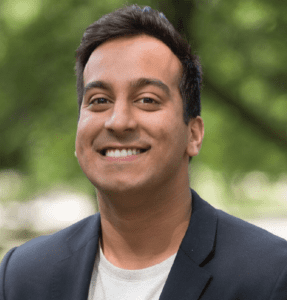 AFTD Board member Abrar Tanveer says that his father, Shakeel, was the “life and light in every room he walked in, and an incredibly social individual.” A devoted family man and a dedicated member of his community, Shakeel was the driving figure behind the Islamic Center of Greater Cincinnati, identifying the building site and raising money for its construction.
AFTD Board member Abrar Tanveer says that his father, Shakeel, was the “life and light in every room he walked in, and an incredibly social individual.” A devoted family man and a dedicated member of his community, Shakeel was the driving figure behind the Islamic Center of Greater Cincinnati, identifying the building site and raising money for its construction.
But when Abrar was in college, he noticed changes in his father’s personality; he wasn’t as confident with his words or in social interactions. In the summer of 2016, when Abrar was 21, Shakeel was diagnosed with primary progressive aphasia (PPA) – an FTD subtype that primarily affects communication skills.
“At that time, my family and close family friends had a feeling something was going on with my dad, but we had no idea it would be PPA,” Abrar said. “Seeing what my father had to go through firsthand was very difficult for the family.”
Shakeel’s communication skills declined in the year following his diagnosis, with movement difficulties setting in as his PPA progressed. In 2019, Shakeel passed away in hospice surrounded by his family. The family’s FTD journey had a profound impact on Abrar. “It was through his struggle and experience that I decided to get involved with AFTD to try and make a difference,” he said.
Abrar discovered AFTD while preparing to run the 2020 Flying Pig marathon in Cincinnati and created a fundraising page in his father’s honor. When the COVID-19 pandemic caused the marathon to be delayed, Abrar used the extra time to train, and completed the marathon in October 2021.
“After that, I was asked to speak at the 2022 Education Conference in Baltimore, which was my first face-to-face introduction to the AFTD community,” Abrar said. “That same year, I ran a half marathon, raising $5,000 for my dad, and kept in close contact with the organization.”
After meeting AFTD Board members at 2022 Education Conference, Abrar left Baltimore with the goal of becoming a Board member himself. To Abrar’s surprise, he was asked to join the AFTD Board that same year, and officially joined as a member in 2023.
“During my tenure on the Board, I hope to leverage my experiences to create a space for young adults to share their challenges and find support resources,” Abrar said. “My dream is that nobody has to feel lost when helping someone they love deal with FTD. I truly believe AFTD is building that future one day at a time, and I’m honored to be a part of that journey.”
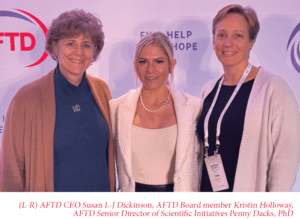 AFTD held its second annual Holloway Summit last Nov. 30-Dec. 1, bringing together people with lived experience of FTD, experts from academia and industry, and nonprofit partners to discuss the current state of FTD biomarkers. Holloway Summit meetings, which convene scientific leaders in FTD to discuss how research on the disease can be accelerated, are made possible through the generosity of AFTD Board member Kristin Holloway and the Holloway Family Fund.
AFTD held its second annual Holloway Summit last Nov. 30-Dec. 1, bringing together people with lived experience of FTD, experts from academia and industry, and nonprofit partners to discuss the current state of FTD biomarkers. Holloway Summit meetings, which convene scientific leaders in FTD to discuss how research on the disease can be accelerated, are made possible through the generosity of AFTD Board member Kristin Holloway and the Holloway Family Fund.
Biomarkers are crucial in the effort to better understand FTD, enabling clinicians to diagnose the disease earlier, track progression better, and more accurately evaluate the effects of experimental treatments. While the 2022 Summit focused on emergent technologies that can monitor disease symptoms and function, the 2023 meeting centered on biomarkers that can be found in fluid samples and medical-imaging data.
New biomarkers are being studied for FTD that is associated with tau and TDP-43 protein accumulations. Johns Hopkins Medicine’s Philip Wong, PhD, and Mayo Clinic’s Leonard Petrucelli, PhD, a 2019 FTD Biomarkers Initiative grant recipient, presented their findings on the use of cryptic peptides as a biomarker for FTD that is linked to TDP-43 impairment. Most notably, cryptic peptides could potentially be used in sporadic FTD not caused by a genetic mutation. Other researchers discussed the development of tau imaging and fluid biomarkers.
The Holloway Summit also highlighted efforts to better refine the understanding of existing biomarkers. For example, researchers with the ALLFTD study discussed the Neurofilament Surveillance Project, which aims to better understand neurofilament light (NfL), a biomarker that, while useful, is notorious for variability when taking measurements. ALLFTD’s study aims to understand the variations by analyzing NfL levels and health factors in participants over a three-year period.
Despite an ongoing need for advancement in the field, presenters emphasized that research on FTD biomarkers is rapidly progressing. Additionally, many Summit attendees said that the discussions at the conference would spur their own research.
“Overall, the 2023 Holloway Summit reflected researchers’ growing hope that FTD biomarker discovery is imminent,” said AFTD Research Project Manager Amanda Gleixner, PhD. “Not only is biomarker science making steady progress toward earlier and more accurate diagnosis, it is also paving the way for clinical trials targeting specific mechanisms of FTD.”
The meeting was chaired by Danielle Graham, PhD (Biogen), Stacie Weninger, PhD (FBRI), and Henrik Zetterberg, PhD (University of Gothenburg). AFTD’s Penny Dacks, PhD (Senior Director of Scientific Initiatives), Debra Niehoff, PhD (Director of Grants and Research), and Dr. Gleixner worked with the meeting chairs to develop the program.
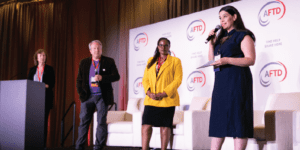 AFTD is looking forward to having persons diagnosed, current and former care partners, researchers, and healthcare professionals gather online and in Houston, Texas, on May 3 to connect, learn, and engage at AFTD’s 2024 Education Conference.
AFTD is looking forward to having persons diagnosed, current and former care partners, researchers, and healthcare professionals gather online and in Houston, Texas, on May 3 to connect, learn, and engage at AFTD’s 2024 Education Conference.
Attendees will have the opportunity to connect with a variety of exhibitors, scientists, and AFTD staff, and hear from FTD advocates, such as New York State Senator Michelle Hinchey, this year’s Keynote Speaker. Since taking office in 2020, Senator Hinchey has been a strong and passionate advocate for families affected by FTD, introducing bills to designate an FTD awareness week and create a state FTD registry in New York.
In-person activities in Houston include two socials – one for persons with FTD and their care partners, and one for young adults – along with an “FTD in the Arts” gallery that attendees can visit to look at artwork made by members of AFTD’s community. Persons diagnosed and people from families with familial FTD can meet up for a continental breakfast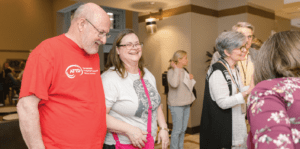 on the morning of the conference. There is also limited space to share stories about FTD during the optional Story Circles session, occurring on Friday morning.
on the morning of the conference. There is also limited space to share stories about FTD during the optional Story Circles session, occurring on Friday morning.
Virtual registration gives you the opportunity to attend only the sessions that interest you. Sessions focus on different FTD topics, including the Persons with FTD Advisory Council’s discussion on the stigma that people with FTD experience due to their illness, and “FTD Research: From Funding to Fruition,” where three AFTD grant recipients will present their research. Virtual attendees will be able to submit questions for the speakers and chat with other attendees for each session.
This year’s breakout sessions, held at 1 p.m. and 2 p.m. CT, will give attendees the opportunity to explore specific aspects of FTD, from the lived experience and management of symptoms to research and how to advocate with your legislators. While some breakout sessions will be available in a hybrid format, others will only be available to in-person or virtual attendees, respectively.
To sign up for the free conference, visit the registration page at theaftd.org/education-conference-2024.
Comstock Travel Grants are available for persons diagnosed and their care partners to help offset the costs of attending the conference in person. Learn how to apply at theaftd.org/living-with-ftd/resources/comstock-grants.
In January, AFTD and the Alzheimer’s Drug Discovery Foundation (ADDF) announced an extension of the Treat FTD Fund program through 2035, providing an additional 10 years of support to accelerate treatment development for FTD disorders.
The Treat FTD program provides essential funding for early-stage clinical trials testing disease-modifying and symptom-relieving treatments. While the program supports experimental drugs, it also provides backing for projects evaluating medications approved for other conditions that can potentially be repurposed to treat FTD disorders. The open-label clinical trial being overseen by grant recipient Simon Ducharme, MD, MSc, is evaluating the use of nabilone, an FDA-approved synthetic cannabinoid, for use in treating agitation in FTD.
Non-drug-based interventions can also receive support through the Treat FTD Fund. Emiliano Santarnecchi, PhD, is leading a project evaluating the use of transcranial alternating current stimulation to improve behavioral symptoms and brain activity in persons with FTD.
A generous gift from the Samuel I. Newhouse Foundation enables AFTD to extend this essential program. AFTD and ADDF will each provide $500,000 in funding to the Treat FTD Fund annually.
“FTD presents unique challenges to researchers working towards the effective treatments that are urgently needed for people living with FTD,” said AFTD Senior Director of Scientific Initiatives Penny Dacks, PhD. “However, there is growing momentum behind efforts to develop treatments. Through the Treat FTD fund, AFTD and our partners at the Alzheimer’s Drug Discovery Foundation accelerate that momentum by directly funding the early-stage programs that will often be considered too high-risk for other investors from the for-profit world.”
Phase 1 and Phase 2 clinical trials, like those supported by the Treat FTD Fund, are a critical step in developing effective treatments for FTD. During these first stages of clinical research, researchers determine if a treatment is safe, if there are any side effects, and what the proper dosage should be. Even when experimental treatments do not progress to Phase 3, the clinical trials advance FTD science by providing insights into the disease, often revealing new avenues for further research. For example, while Wave Life Sciences’ FOCUS-C9 trial did not go past Phase 2, the study gathered critical biomarker data, demonstrated a new type of efficient clinical trial design, and showed encouraging results for synthetic-RNA-based drugs.
In February, the care team of the former talk show host Wendy Williams announced that she was diagnosed with “primary progressive aphasia and frontotemporal dementia” in 2023.
Following the announcement, the premiere of the docuseries Where Is Wendy Williams?, and the subsequent flood of media coverage, many members of AFTD’s community reached out to express the raw emotions that have been reawakened within them, along with empathy and concern for Ms. Williams. When FTD is so prominently featured in the news and on social media, persons diagnosed and current and former care partners may feel overwhelmed and need to talk to someone who understands the disease.
Based on feedback AFTD received, Where Is Wendy Williams? was particularly hard to process. AFTD acknowledges that the series is often difficult to watch, and that its depiction of apparent FTD symptoms and the Williams family’s disagreements over Ms. Williams’s condition and care can be triggering for our community. AFTD was not involved with the documentary, nor with any aspect of Ms. Williams’s FTD announcement, and advocates for everyone living with an FTD diagnosis to be shown respect and receive compassionate care.
The AFTD HelpLine saw a marked increase in calls and emails following the announcement from Ms. Wiliams’s care team, likely due to the rise in awareness it sparked. General FTD awareness is the crucial first step in creating a future free of FTD, and AFTD is grateful for the care team’s announcement.
Please know that if the recent news has intensified the emotions of the FTD journey for you or your loved ones, you can reach out to the AFTD HelpLine for support – call 866-507-7222 or send an email to info@theaftd.org.
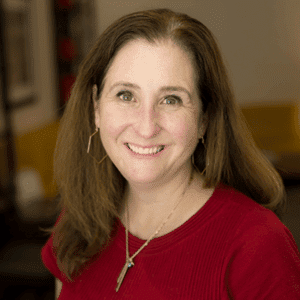
Melissa Fisher
Oregon AFTD Ambassador Melissa Fisher has received the prestigious 2023 Kaiser Permanente David Lawrence Community Service Award. This award is given annually by senior leadership to recognize the top Kaiser Permanente employees who demonstrate “outstanding volunteer activities that improve community health and wellness.”
Melissa’s father is living with an FTD diagnosis. An AFTD volunteer since 2018, Melissa became an inaugural AFTD Ambassador in 2019. “Ever since we received a diagnosis for this terrible disease, I’ve vowed to raise awareness and funds for this organization that gives all of us hope and so much help,” she said.
She has more than lived up to that vow. In addition to her work as an Ambassador, Melissa has participated in nearly every AFTD fundraising opportunity imaginable, including With Love, Food for Thought, and the AFTD-Team Race Season. She has also publicly spoken about her family’s FTD journey on numerous occasions – in 2023 alone, she shared her story with the website GoodRx Health, the VIE Healthcare Podcast, and AFTD’s Help & Hope newsletter.
The David Lawrence Community Service Award is named in honor of David M. Lawrence, MD, a former chairman and CEO of Kaiser Permanente and a lifelong advocate for improving health. The award comes with a $10,000 donation to a charitable organization of the awardee’s choosing, and AFTD is grateful that Melissa selected AFTD to receive this generous gift.
“This is an award for ALL OF US, for all you do each and every day to call attention to FTD and support the persons with this disease and their families,” Melissa told AFTD.
Melissa is a senior strategic marketing consultant at Kaiser Permanente Northwest.
When Helen-Ann Comstock founded AFTD in 2002, she envisioned an organization supported by a mighty national network of volunteers, working together to support families with FTD and hastening a world where FTD is quickly diagnosed and effectively treated. AFTD’s staff works every day to ensure that Ms. Comstock’s vision remains a reality.
As part of that effort, AFTD has been offering virtual gatherings for our volunteers in recent months, allowing them to connect with each other and learn more about what AFTD and our volunteers are doing across the country. Our first virtual gathering, conducted via Zoom, took place last September, and have been held every two months since. All told, these virtual meetings drew 171 attendees, all bringing their own perspectives, ideas, and areas of interest (support group facilitation, community awareness, advocacy, fundraising, and more).
The gatherings have explored a variety of themes, including the power of AFTD Meet & Greet events, how to team up with other volunteers, creating an elevator pitch, and understanding how to support those seeking help on their FTD journey. Attendees have told AFTD that they appreciate the opportunity to connect with each other, AFTD staff, and AFTD Ambassadors, as well as to learn about volunteer opportunities that match their talents and interests.
If you’re interested in attending a virtual volunteer gathering, stay tuned to your email for chances to register! And to learn more about AFTD’s volunteer network and how to get involved, visit theaftd.org/get-involved/volunteers-network.
"Connecting with volunteers nationwide gives me a sense that I’m not alone in the struggle of caregiving, grieving, advocating, and supporting others on this journey – while also learning more about the opportunities available to me as an AFTD caregiver."
- Sandra Gonzalez-Morett, AFTD Ambassador
"[The meetings] have been very helpful to me for a few reasons. Meeting other volunteers and hearing how they go about their work directly from them –including dealing with specific/thorny issues – is appreciated, as are the personal connections with both staff and other volunteers these gatherings provide."
- Dan Moser, AFTD Support Group Volunteer
"The breakout rooms allowed for intimate conversations – I connected with a few ladies who shared their stories of how FTD impacted them and some of the struggles they continued to face. I also got to hear stories from people who’ve volunteered for over a decade, which was really cool."
- Scott Oxarart, New AFTD Volunteer
"During the [meeting], a support group volunteer said something to the effect of, “At the end of the day, sometimes all we can do is keep the person with FTD safe and their care partner sane.” I have been living that for the past seven years with my parents. I’m exhausted, but somehow always feel like I’m not doing anything, or not doing enough. That statement was immensely reassuring, because [being an FTD caregiver] sounds so simple, but it is no simple task."
- Judy Bearer, New AFTD Volunteer
AFTD’s support group network is continuing to evolve and grow! While groups previously only met in person, both in-person and virtual options are now available to support those on the FTD journey, no matter where they are. This robust and versatile network is possible thanks to the efforts of AFTD’s Support Group Volunteers (SGV), who often bring FTD support and resources to places that need them most.
“Massachusetts has support groups near Boston and in the western part of the state, but there is nothing in the central part of the state, where I live, or in Rhode Island,” said SGV Christine Beauchaine, who started an in-person group to ensure people in those places have access to support. “I love knowing that I may have reassured someone that they’ve been seen and heard and that they aren’t alone.”
Beauchaine noted that care partners are often unprepared for their role due to a lack of training and support. She recalled how she struggled as a care partner for her husband, and wanted to help others become better partners on the FTD journey.
AFTD provides training and support for people who want to start their own support groups. “AFTD provided training through webinars, Zoom meetings, and materials they sent me,” said SGV Al Papesh.
“They continue to provide me and other group leaders with materials instrumental for our success. Even though my wife passed away in April of 2017, it provides me satisfaction in knowing the group is a place for care partners to share their thoughts and ask questions.”
While some who become SGVs, such as Beauchaine and Papesh, bring lived experience of the FTD journey, others, like Stacey Juthapan, bring professional experience to their facilitator roles. Having worked with people with primary progressive aphasia, Juthapan knew how few resources were available to the newly diagnosed and wanted to make a difference for them.
To others pondering making a difference by starting a group themselves, Juthapan says the best way to start is simply to take the first step. “You don’t need all the ‘right’ answers or years of experience,”
Juthapan said. “Just be yourself – that’s more than enough,”
For those looking for support, Juthapan, Beauchaine, and Papesh recommended attending a support group, whether virtual or in-person, to see if they are a good fit. “I believe that there is power in sharing our stories and connecting with others in similar situations,” Juthapan said. “Support groups are here for you to connect, share, listen, and learn.”
To learn more about becoming a Support Group Volunteer, visit theaftd.org/volunteer-form.
To mark National Volunteer Week 2024 (April 21-27), AFTD wants to show our gratitude for our fabulous volunteers by sharing the impact they have made to our mission.
Our volunteers help AFTD reach so many more families on the FTD journey than we otherwise could. The following statistics demonstrate the generosity of our volunteers during the nine-month period spanning July 2023 through March 2024.
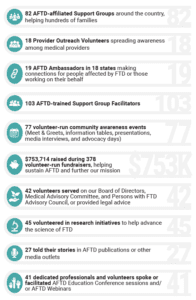
Thank you, one and all! If you want to join AFTD’s national volunteer network, we invite you to join and start making a difference today. Visit theaftd.org/get-involved/volunteers-network to get started!
 In February, AFTD held our 13th annual With Love campaign. This year, 27 people affected by FTD joined their voices to share their unconditional love, personal experiences, and creativity, all to help raise funds and spread FTD awareness.
In February, AFTD held our 13th annual With Love campaign. This year, 27 people affected by FTD joined their voices to share their unconditional love, personal experiences, and creativity, all to help raise funds and spread FTD awareness.
AFTD is so thankful to everyone who contributed to With Love – together they raised more than $38,000 to advance our mission. We’re grateful for the continued generosity of The Rainwater Charitable Foundation for matching the first $10,000 raised, the hundreds of people who made donations – and, of course, our fundraisers, who took the opportunity to be vulnerable and share their journeys:
Ashley Vecchione
Barbara Becker
Blaire Derouen
Camille Dunn
Chuck Anastasia
Claudia Seitz-Ricklick
Dianna Smith
EmployHQ
Erin Walla
Guillermo Fornarino
Guy Margolin
Jack London
James Medeiros
Jennifer Anyong
Jillian Queeney (Condran)
John Kammerer
Kristen Celusniak
Kristin Pursley
Laura Dropps
Libba Adams
Liz Matthews
Mary Diane Newham
Melissa Fisher
Michelle Slough
Scott Oxarart
Susan Scarff

The 2023 AFTD-Team Race Season went by in a flash! We took to the streets and participated in six events nationwide: the Austin Marathon in February, the Los Angeles Marathon in March, the Colfax Marathon in May, the TCS New York City Marathon and the Philadelphia Marathon in November, and the Dallas Marathon in December.
On behalf of AFTD and the community we serve, we want to extend our heartfelt gratitude to all the runners, joggers, walkers, and their supporters for their enduring commitment to this active campaign. We would also like to give a special cheer for the
individuals and families who not only went the distance, but raised critical funds for AFTD’s mission through one of the following races:
Austin Marathon
Patrick Mele
UT Austin Aphasia
Research and Treatment
Lab
Steph Kipp McLain
Margaret Eissler
Zoy and Kiley Kocian
Kelly Canavan
Barbara Loewy
Stacey Fletcher
Linda Esper
Jess Ambiee
Courtney Brown
Philadelphia Marathon
Elizabeth Moore
Molly Trimmer
Team Jack Attack
Edward Brown
Mark Christopher
Elizabeth Hollingsworth
Tracy Needle
Emily Chorbajian
Tara McElwain
Lisa Claire Witomski
Katie Needle
Steven Gruber
David Topolewski
Liz Zadnik
Karen Needle
Los Angeles Marathon
Tara Wheeler Rice
Mary Allison
TCS New York City
Marathon
Janice Lee
Daniel Hedaya
Merry Bergan
Mike Brucklier
Caroline Waldeck
Hannah Lipman
Ngozi Musa
Frances Altick
Flavia Mahfuz
Veronica Wolfe
Jules Brouwer
Popkin Shenian
Dallas Marathon
Rachel Cohen
Jennifer Anyong
Caroline Cary
Lauren Shaw
Lisa Kelly
Anna Kuykendall
Colfax Marathon
Elica Sharifnia
Sarah Craig
Katie Johnson
Caitlin Horne
Mark Mauries
Cindy Bredsnajder
Krista Glodt
Melissa Autry
Stephanie Norville
Independent Events:
Write for the Fight:
Former AFTD Board member Paul Lester of North Carolina hosted his 17th annual letter-writing campaign in memory of his late wife, Arnette. These heartfelt letters went out in both paper and electronic versions asking his family and friends for their continued support – and, thanks to Paul’s generous matching gift, raised a total of $11,462. Since starting this annual event, Paul has raised more than $178,000 toward the fight against FTD.
For Susan and Si:
As a part of their wedding registry, Andrew Newhouse and Alexis DeMarco asked for donations to benefit AFTD’s mission, in memory of Andrew’s grandmother Susan Newhouse and great uncle Si Newhouse, who passed away from FTD in 2015 and 2017, respectively. The couple’s family and friends supported an organization near and dear to their hearts by allowing them to donate $10,000 to further AFTD’s mission.
Doing Good(s):
Former AFTD Board member Michael Stowell of Colorado hosted an online auction of premium goods, raising $9,386 for the fight against FTD. This December delight was hosted in memory of Ned Shepherd, Michael’s stepfather, who lived with an FTD diagnosis for five years until his 2011 passing.
For Reid:
Luke Smiley, a high school student in Tennessee, took on the Chattanooga Half Marathon on March 3. He dedicated all 13.1 miles to his father, Reid, who died from FTD, and donated the $6,751 he raised to AFTD’s mission in Reid’s memory.
Slam Dunk:
AFTD Ambassador Spencer Cline of Georgia hosted another fundraising night at his alma mater’s basketball game in memory of his late father, Lawrence, who was diagnosed with FTD in his mid-40s and died in 2012. The Babson College men’s basketball team not only was victorious, they raised $6,502 to benefit AFTD’s mission. To date, this annual event has raised more than $26,000 and spread an unmeasurable amount of awareness.
A Tradition Unlike Any Other:
The Robert M. Hatfield Foundation hosted its annual Quest for the Cure Golf Tournament on December 15, 2023, at the Bardmoor Golf & Tennis Club in Florida for the 13th year! The day featured a 12:30 p.m. shotgun start, followed by dinner and awards in the evening. This excellent event raised $5,000, with a portion of the funds raised going toward AFTD’s research efforts, bringing the event’s total to $90,000 raised for AFTD’s mission since 2011.
Passion Play:
Bob Powers of Oregon created a new play titled Laughing Matters and debuted it at the CoHo Theatre in Portland, Ore., on December 1, 2023. After a successful performance, Bob donated $3,520 to AFTD’s mission in loving memory of his husband, Donald Clement, who was diagnosed with PPA in 2013 and died in 2021.
Mission Accomplished:
Throughout 2023, Jim Lyne from Wisconsin was a man on a mission to row 1 million meters on his rowing machine! He did this challenge in memory of two of his sisters, Cathy Pfeifer and Jeannette Ekstrand, who passed away from FTD and ALS in 2016 and 2019, respectively. Not only did this superstar surpass his goal, he also raised $3,510 to support AFTD’s mission!
Two Thumbs Up!:
Redeye Reviews is a comedy movie reviewer on YouTube. Every December, the channel dedicates its videos to raising funds for a specific organization, and in 2023 it chose AFTD, in homage to the reviewer’s favorite Bruce Willis movies. Redeye Reviews published 10 videos, each of which encouraged viewers to donate to AFTD. Those gifts, plus the personal donation that Redeye Reviews made with each new channel subscriber, accounted for $3,287 raised to further AFTD’s mission.
Good Fortune:
Lorraine Bonaventura, Janice Bonaventura, and Angela Dufresne organized an art exhibit and sale featuring the works of their sibling Lizzie Bonaventura throughout October. Held at the Heimbold Visual Arts Center at Sarah Lawrence College in New York, the event was titled Elizabeth Bonaventura: If We Change the Way We Look at Things, Do the Things We Look at Change? Following the sale, the team contributed $2,859 toward the pursuit of a cure for FTD.
A Cut Above:
Nidal Estiban and Melinda Kavanaugh joined forces at the Entourage Salon and Spa in Sheboygan, Wis., for their Annual Holiday Open House. Starting November 12 and lasting through the holiday season, salon customers could donate to AFTD’s mission in exchange for services. Through this stylish fundraiser, they raised $2,851 in honor of Mary Lou Massara, the mother of one of the salon’s employees, who is currently living with FTD.
Endure for a Cure:
Thomas Massey of Illinois took on the Dopey Challenge at the Disney World Marathon on January 4. Every step of its 48.6 miles honored his dad, Dave Massey, who is currently living with an FTD diagnosis. In addition to enduring such a challenging course, Thomas raised $2,669 to fight this disease.
